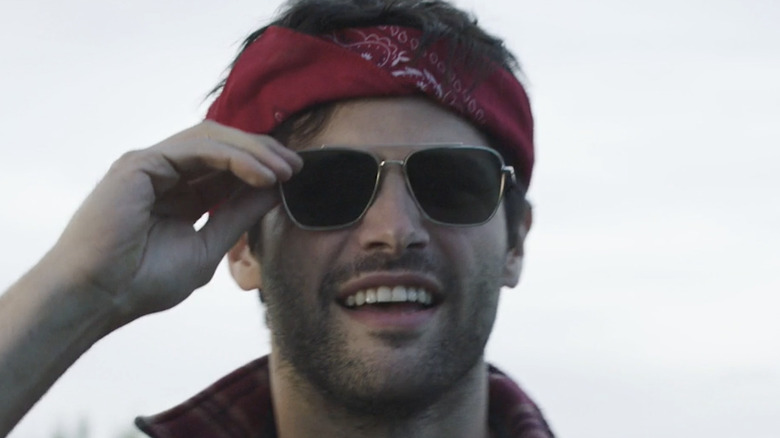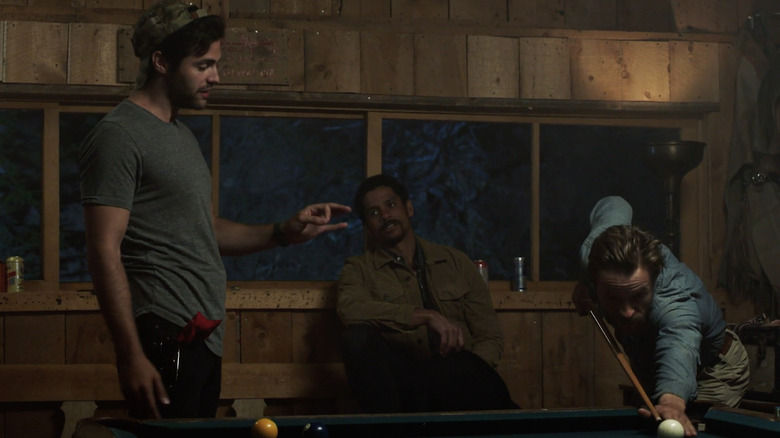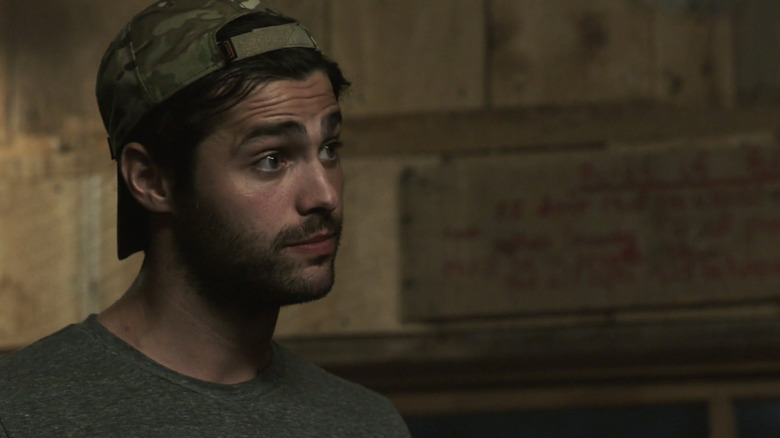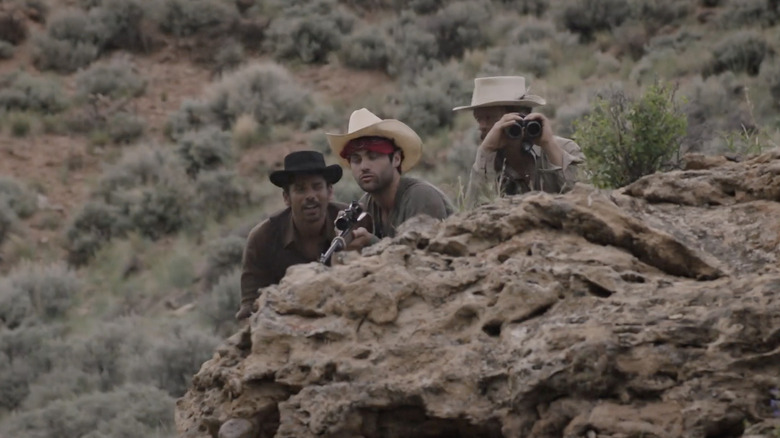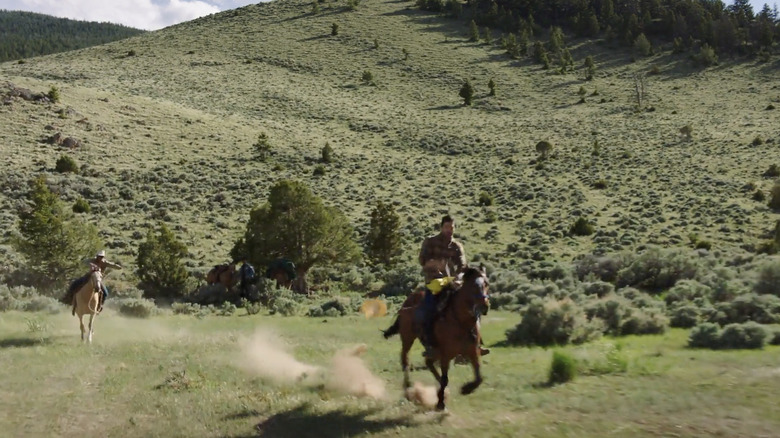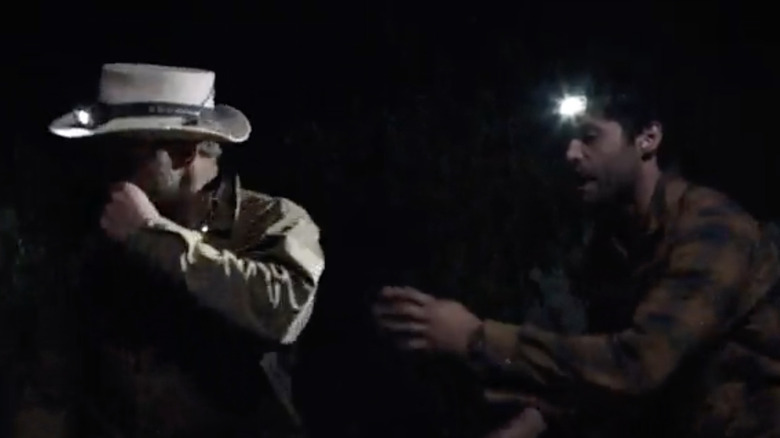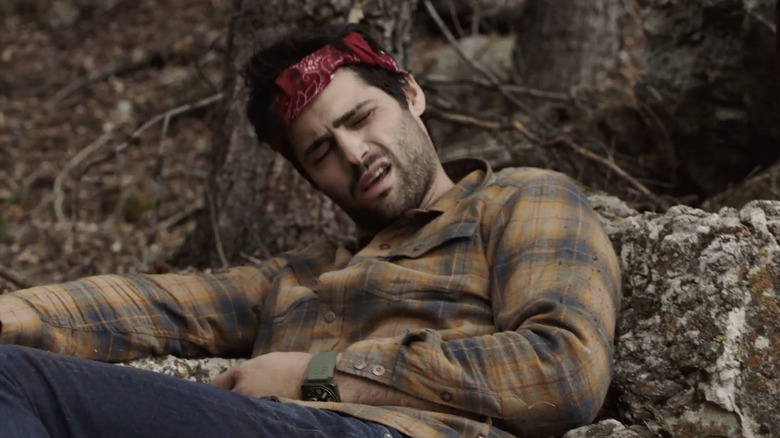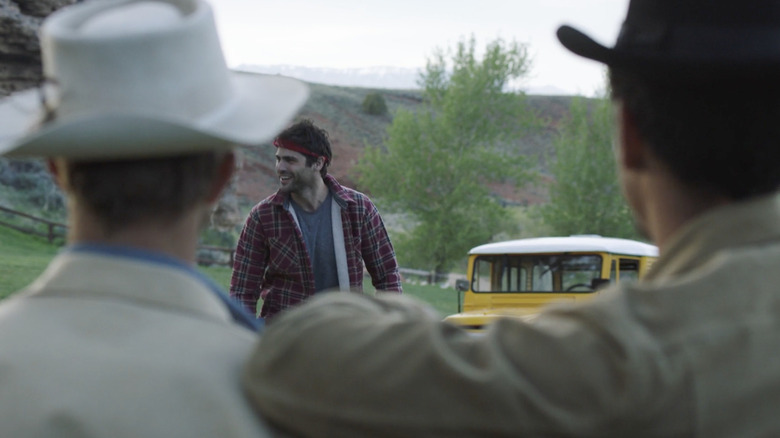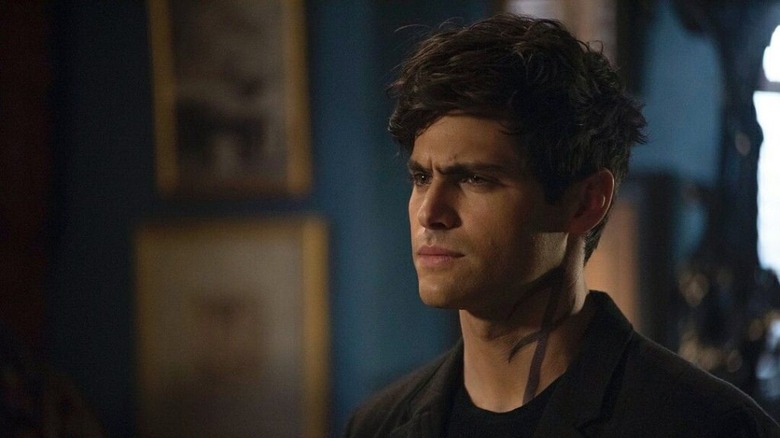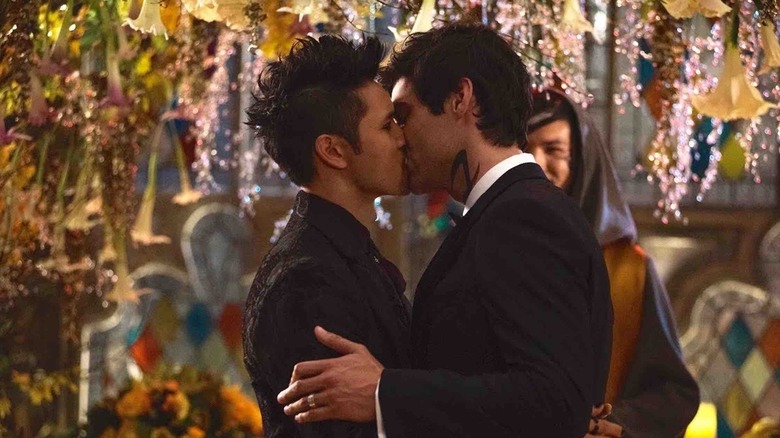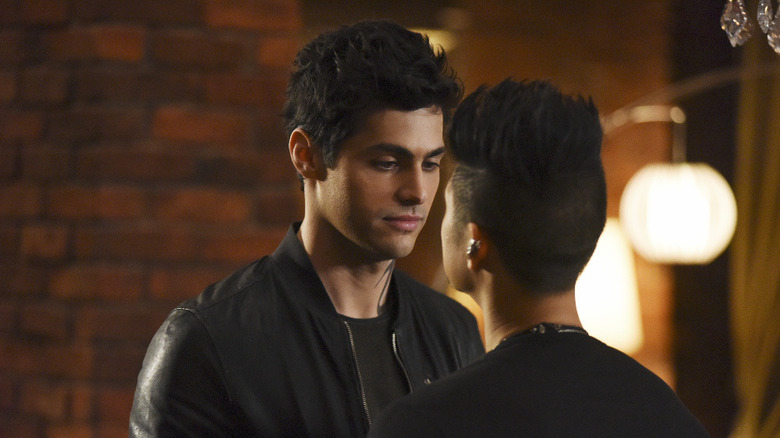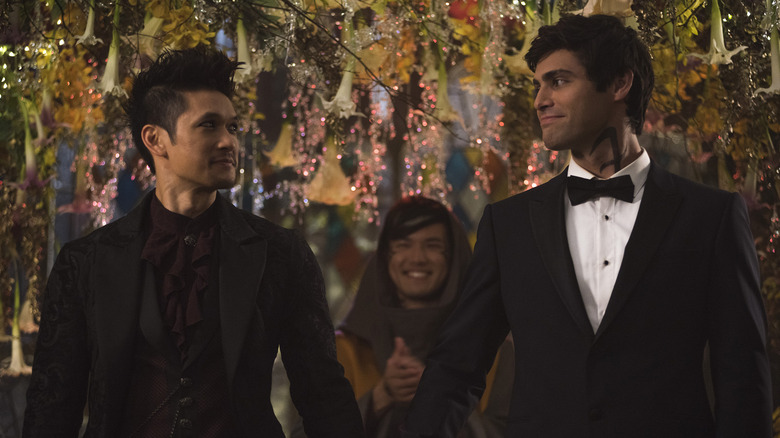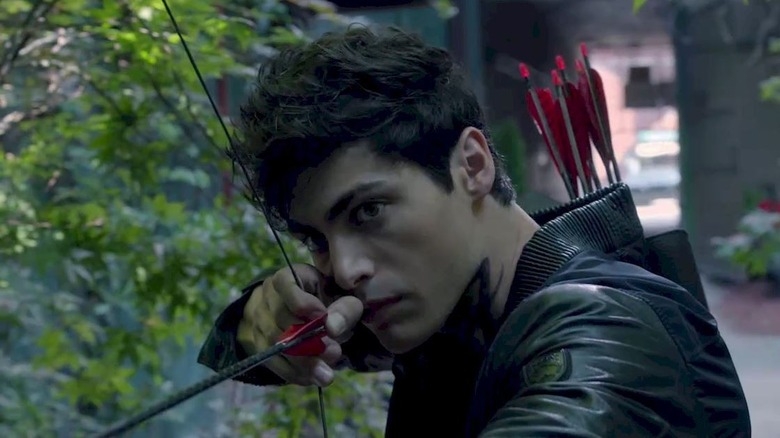Wild Game's Matthew Daddario Discusses Horseback Riding, LGBTQ+ Representation, And Shadowhunters - Exclusive Interview
Matthew Daddario has been hard at work since the ending of "Shadowhunters." The actor first made a name for himself in movies like "Breathe In," "36 Saints," and "Delivery Man" before winning roles on "Growing Up and Other Lies," "When the Game Stands Tall," "Naomi and Ely's No Kiss List," and "Cabin Fever." From there, Daddario snagged the beloved role of Alec Lightwood on "Shadowhunters" — a TV series based on Cassandra Clare's "The Mortal Instruments" books. He played one half of the series' most passionate ship alongside Harry Shum Jr. as Magnus Bane before landing a new TV show, "Why Women Kill." He also teamed up with "Shadowhunters" lead Katherine McNamara for the recent film "Trust."
During his time on "Shadowhunters," Daddario also starred in and executive produced a short film called "The Last Hunt," which brings us to his new movie, "Wild Game," featuring much of the same cast and crew. Here, Daddario plays Donnie, a method actor famous for playing a "vegetarian vampire." As Donnie gears up to play a hunter in a new film, he drags a group of farmers into his clueless shenanigans.
Looper spoke to Matthew Daddario during an exclusive interview where he discussed "Wild Hunt," the film's horseback riding, and whether or not he considers himself a method actor. He also reminisced about his time on "Shadowhunters," working with Harry Shum Jr., and how he feels about Magnus and Alec's ending. Daddario even pitched an epic holiday special idea for a potential "Shadowhunters" reboot.
Getting the gang back together
"Wild Game" has quite a few actors from your short film, "The Last Hunt," which you were an EP on. How did "Wild Game" come about, and what was the most exciting aspect of being in the film?
So, "The Last Hunt" song we did many years ago with the same crew, as you say, and basically was initially meant to sort of be a starting project to then a proof of concept of a larger film. And we never got around to doing that because the stars didn't really align properly with the various schedules and people doing stuff and all that. And we had an opportunity to make this a little while back, and everyone was available, and everyone came together, and we managed to make it. And I think that it was just nice to have something that we planned on doing and then getting it done. It's a relief. We planned on this, we knew we wanted to do it, we knew how we had to do it, and we managed to get that all together. I'm thrilled we managed to get it done for sure.
Was it cool seeing everyone again and being in that atmosphere?
Oh, I can't state it enough. I can't overstate it. The group of people involved in making this film are so incredibly competent, are so incredibly skilled, and are so easy-going — are nice. It was an amazing experience. And every day at the end of work, we'd all eat dinner, all of us, and go over the day and also just chit chat, whatever. It was such a lovely experience. If every filming experience was like that, I would just spend all my time doing just that all the time. But unfortunately, it's, of course, not how it always works. And obviously, there's a huge amount of work that goes into it ahead of time. A huge amount of work afterward. The filming part is the vacation. The rest of it is endless.
Everyone knows "that one" actor
Your character is a bit of a meta version of the stereotypical Hollywood actor. Did you feel at all weird to play an actor in a movie? And did you draw on any behaviors that you've seen from some of those less fun actors to work with?
That is spot on. Yes, exactly. That is where Donnie comes from. He is a collection of people I've met over the years, and he is the worst of all those qualities. And I think he's got that quality. There's a certain intensity [and] falseness [that] makes you really feel good about yourself though when he wants to. And he can convince you of certain things, and they seem like great ideas under the circumstances, and he's definitely that type.
It's not weird to play an actor, though. I don't find it weird, in fact, it's maybe it's very easy because [I've had] a lot of exposure to them, and actors are pretty odd characters sometimes. There [are] certain odd qualities that actors carry, not all of them, but some of them, and they're easy to identify. And a lot of it is a caginess and [a] certain squirrel and certain unwillingness to reveal themselves in real life, especially among some that have worked more. They start to hide a little bit, and the ones who don't hide in a humble way hide in a more sinister way. And we get some of that with Donnie.
Breaking down method acting
I love the over-exaggeration of your character's method acting. Do you consider yourself to be a method actor?
No, I'm not a method actor. I think I know what the term means, but the term gets thrown around a lot in a way that I don't fully understand anymore what exactly people mean by that. Whether it means you're living every day in the life of exactly the character you're playing, which is to me an absurdity, or trying to gather some truth through experience about a character. For example, maybe Donnie's not completely wrong. He wants to play a big hunter in this film.
And so he wants to go for a hunt in real life. Fine. But is that really going to expand your understanding of the hunting process? It depends. If it does, and then it enables you to perform in a way, the audience will feel or will understand what you're trying to portray better, then it's successful. But the fact is that in Donnie's case, he's not going to do a damn thing. He goes there in his silly hat. He's got this shirt that I grabbed out of that closet for these interviews that he bought on the way there, of course. And he's full of s***. He's full of s***.
Back in the saddle
You do a fair bit amount of horseback riding in the movie. Is this something you grew up with, or did you recently get involved with that?
No. I'm just very startled by how easy it is to ride a horse. If it's a good horse, it's really easy. And if you have a good teacher, Creed Garnick told me what we [had] to do, this [is] how it works, and then you got on the horse, and then you ride it. And it listens to you. It also tells you when it's not in the mood to do something, and you can tell it back, [you've] got to do this.
But these horses have a huge amount of space to roam, and they are always out. And they like to get ridden, a lot of them. In fact, most of these do. And so when they come in, they get to be ridden. They get excited. They like that too because the majority of their time is spent over 2,000 acres running around and having a good time and doing their thing. So, you get this little time with them, and they seem to like it. And then when they don't like it anymore, you say, "Go ahead. That's the end of that."
Can't force it. They are strong as hell, man. That's one thing growing up in New York. I've seen horses, obviously. I understand the concept of them. I've Seen the Clydesdales in St. Louis and all that. But they are strong. They are really strong.
They'll beat you up if they want to.
You have nothing on a horse. Zero.
Nature versus the city
"Wild Game" takes place in nature for a good amount of the film. Was that a nice change of pace from sets and city filming, or did it pose a lot more challenges?
It poses more challenges. It also forces you to take some liberties with lighting, which instead of setting up in the most formal of ways. So, you suffer for that unless you want to spend the time doing it exactly right. But you do suffer for that in terms of some of the production value. And I could get into all that area, but I'm not a full expert in all of that stuff. So, hearing it from me is not all that meaningful. But I will say that definitely it makes things more difficult. But escaping from the studio is nice. If you're in a studio all day, every day for months on end, it messes with you a little bit — a lot, actually. And so it's nice to get outdoors sometimes.
From Shadowhunters to Wild Game
What do you think fans of your projects like "Shadowhunters" and "Why Women Kill" will enjoy about "Wild Game"?
See, that depends. If they liked [my] acting, if they're watching for me, which is a mind-boggling and wonderful thing if true. And thank you to anyone who is doing that. This might be nice because this character is the worst. He's just the worst. And generally, the characters I play are more likable in general. I think that's something that I try to do with my characters, even if they aren't operating as the good guy necessarily. I like to convince the audience that the person is actually ... I want to make the audience like the characters I play because it makes them question themselves.
I'm a big believer that it's really hard to nail down exactly, this person does things I don't like, but I still like the person, though. And now I'm going to start rooting for him. You fundamentally don't like what he's doing, but you like him. Why is that? And that's what I like to go for with the people that I play. But, and Scooter, for example, in "Why Women Kill" [Season] 2, I hope gets a little bit of that. I hope he's a little bit likable. He's real dumb.
I think that's something. And at the same time, look, it's an adventure film. It's a quick film. It's an hour-and-a-half long, and it's unusual, it's strange. It's not like other movies that we see regularly. It's an unusual film. I can't stress that enough, and I probably should stress it more. It's definitely different than the norm. That's what I would say.
A fun, quick film
It's refreshing to see an easily digestible, just a fun hour-and-a-half film. Everything's like three hours these days.
You see, that's another thing that with the streaming services and everything, you benefit by having TV. And a lot of actors prefer TV and whatever. In this case, there is a whole world of films that you can make an hour and a half long, two hours maximum, and you can make them on pretty limited budgets with good stories. If you have good stories and good people, and we're going to try and improve in that area. We're going to try and do more of these except each time better and better and better, and keep the costs slow.
And [there are] ways to do that. And I think that the streaming platforms are perfect for it. If you want on-demand, what you do is you basically go home, and you say, "Okay, what am I going to watch today? I don't want to watch [five or ten hours]. I can't invest that time on this big-budget thing. I want to see that in the theater." This movie's perfect for exactly the kind of consumption. It's Friday night, when you're in that ballpark when you want to watch something, this is what you watch.
Kicking it with Harry Shum Jr.
Speaking of "Shadowhunters," the show has been off the air for years, and the fan base is still so passionate and present. What was it like working with Harry Shum Jr., and what were some of the most rewarding scenes in the show or moments on set that you had with him?
First of all, the fans of "Shadowhunters," you could write a book on it. It's this scale, and the enthusiasm for the show and for the actors involved has been the best thing to happen to us ever. You do this show. And you can do a show, and it can exist in a vacuum, and no one can hear about it.
Or some people, in the case of "Shadowhunters," we have people who are constantly supporting us and constantly interested, and it made us work harder. It made us care more about our characters, made us care more about what we were doing. And then also it's incredibly rewarding. It's also very humbling. And the fandom, in general, was and is just incredible. And so, we are all extremely thankful for that.
Working with all these other actors, who are all also extremely thankful for that, was also a wonderful experience. With Harry, [he] is just an incredibly talented individual, frustratingly talented. And working with him, working with Isaiah [Mustafa], with everybody, they're all just great actors. It was a real treat. And honestly, my best memories were in a studio a lot, and it runs together a lot.
A lot of it does, but it's laughing on set when we're setting up a shot and having a good time toward the end of the day, maybe. Maybe at the start of the day. It's just everybody's in it. And then going out with everybody, going out to dinner, having a good time. It was a very intense schedule because we were there for 20 episodes. We're there a lot of months, and [those were] our friends, and [those were] our people. So, it's a time I'll never forget.
An epic ending for an epic couple
Fans of "Shadowhunters" were lucky enough to get an ending to this show after the cancellation. How do you feel about Magnus and Alec's ending and the show as a whole?
So amazing! Look, everybody else can talk about their characters, so I'm not going to put words in that mouth. But Alec gets a full story arc properly with a beginning and ending. Beginning, there's a thing that's bothering him, something that's hurting. It's an error in himself, and he fixes that error through a process, and then that error eventually leads to the perfect outcome for him, which is falling in love, getting married, and he gets the job that he's appropriate for and everything.
His life just went from down here having this lady come in and mess up his life: Clary. And then it ends beautifully with his whole life in order and lovely and delightful, and a husband to match. It's perfect. It's perfect.
The holiday special we all need
Would you be down for a "Shadowhunters" reboot or even something smaller like a holiday special if given the opportunity? And where would you like to see Magnus and Alec in their journey if something like that were to happen?
Holiday special. Call it, this [is] what it is: Santa Claus gets taken over by demons, and they have demonic sleds and demonic reindeer. Or just put demonic in front of all the things: demonic presence, demonic cheer, demonic snow, demonic North Pole, whatever. All that, and [they've] got to go fight them. And the whole time, they get interrupted at a Christmas sweater party.
So, the whole time they're fighting in this ridiculous Christmas gear, and t's bloody, it's a blood bath, and it's real. The audience that was watching ["Shadowhunters" is] older now. We're going to give you a real dark side of this "Shadowhunters" world, and it's going to be intense. There's not a lot of light. There [are] broken cars at some places, and also buildings blow up. Everybody likes that stuff, whatever. There's your holiday special. And at the end, they all celebrate Christmas together by a roaring fire in front of demonic Santa Clause's defeated troops.
And what are Magnus and Alec doing during this?
What are they doing? They're drinking hot toddies together. They're sitting in old chairs next to each other like, look what we did, how fantastic. Let's get back to work, shall we?
Please, for the love of God, pitch this to someone.
I think they might look at me weird, but we'll see.
The LGBTQ+ representation fans deserve
What has it meant to you to see how impactful Alec and Magnus have been to the [show's] LGBTQ+ fans and to be a part of some of the best representation that we've ever seen on TV?
We were very focused on trying to do that all right. We didn't know [what] exactly the right steps were, what we should portray, how we should portray [it]. But it became very apparent that very early on, that was an extremely important element of what we were doing. And I would say now that you're always nervous about it. You don't know, is this actually going to help you? It's one thing to do a service. And you do something you're like, "I did this," and therefore people are going to really say, "Good job, you represented us in this way." That's meaningless. It has to be more complex. It has to arrive at something that actually benefits people. I need to see actual benefit.
I want to see people who actually are better off as a result of that. And that is a wonderful gift when that happens. And in this case, we have people who come up to us, and they say this helped with this. And I say, "If it worked in that way, then thank you so much." First of all, thank you for letting me know because that makes me feel good that I did the right thing. And we're just happy that it had a positive effect, and we're happy that we didn't mess it up. Because it would've really sucked to do something like that and just really screw it up.
Ready, set, action
You had a whole lot of heavy-duty action sequences in "Shadowhunters." What was that training process like, and how much of the final product was you versus a stunt double? And would you say that "Shadowhunters" was the most demanding project that you've done in that regard?
Yeah, it was. It definitely was the most demanding project. Actors like to do their own stunts. It's so stupid. It's such a dumb thing. You do within your limitations, but there's no reason that you need to even go jumping off something three feet high.
You don't know what you're doing. You're an actor. Even if you've done stunt training a little bit and all that, [there are] people whose professional careers is stunt work. And to think that you can take the risks that they're there for, there's a reason they're there. There are smarter people doing the numbers, running the numbers, and realize the danger of you doing this.
And trust me, I've done little things where, without the stunt double, I've broken little bones, I've had other injuries, and you're fine, but is it worth it? Should you be doing it? So, I say, get the stunt people in, give the stunt people what they want, which is stunt time. And that's what we want from them, and it makes you look better. So, I'm all about it. But we did a lot of training and whatnot, but because sometimes you need to have your face in it. But ultimately leave it to the professionals. That's what I say.
"Wild Game" is now playing in select theaters and is available on demand.
